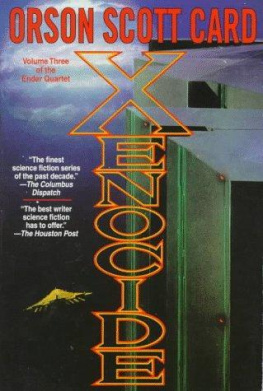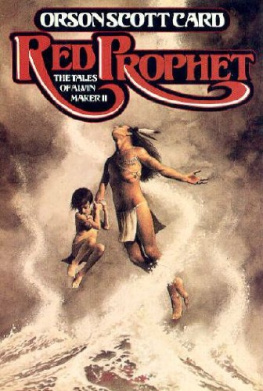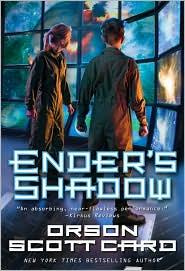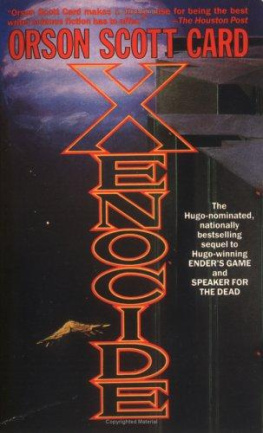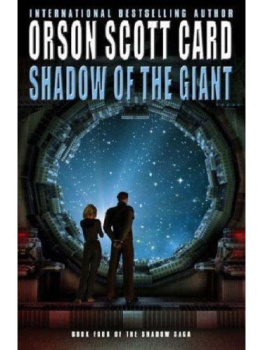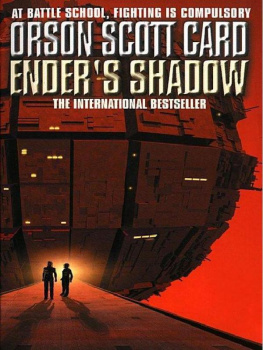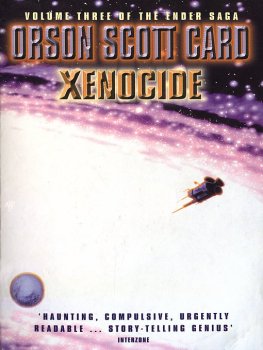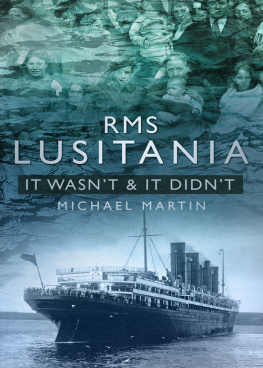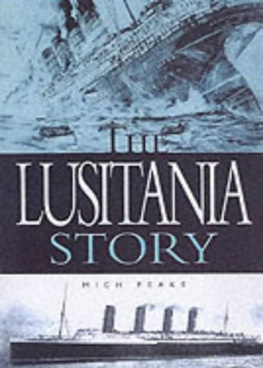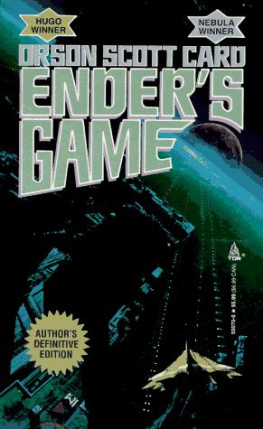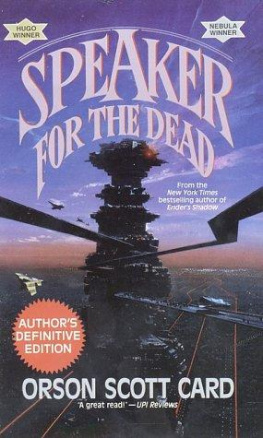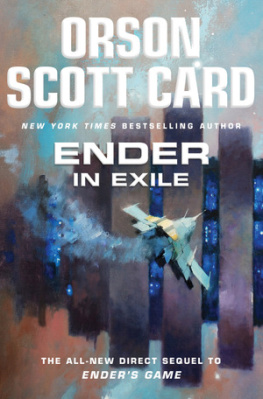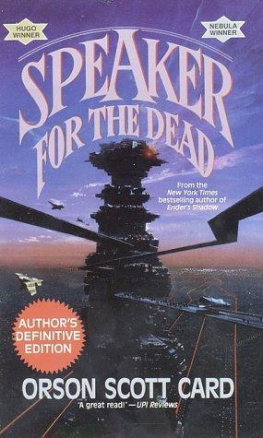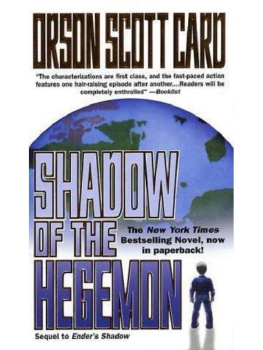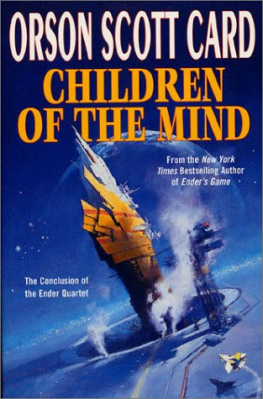Xenocide
Xenocide
To Clark and Kathy Kidd:
for the freedom,
for the haven,
and for frolics all over
America.
Pronunciation
A few names may seem strange to English-speaking readers. From Chinese, Quing-jao is pronounced tching jow; Jiang-quing is jee-eng tching. From Portugese, Quim is pronounced keeng; Novinha is no-VEEN-ya; Olhado is ol-YAH-do. From Swedish, Jakt is yahkt.
Other names are either easier to pronounce as written, or repeated rarely enough that they shouldnt cause difficulty.
Acknowledgments
A chance meeting with James Cryer in the Second Foundation Bookstore in Chapel Hill, North Carolina, led directly to the story of Han Qing-jao and Han Fei-tzu at the heart of this book. Learning that he was a translator of Chinese poetry, I asked him on the spot if he could give me a few plausible names for some Chinese characters I was developing. My knowledge of Chinese culture was rudimentary at best, and my idea for these characters was for them to play a fairly minor, though meaningful, role in the story of Xenocide. But as James Cryer, one of the most vigorous, fascinating and generous people I have known, told me more and more about Li Ch'ing-Chao and Han Fei-tzu - as he showed me their writings and told me more stories about other figures in Chinese history and literature - I began to realize that here was the real foundation of the tale I wanted this book to tell. I owe him much, and regret that I have passed up my best opportunities to repay.
I also give my thanks to many others: To Judith Rapport, for her book The Boy Who Couldn't Stop Washing, which was the source of the information about obsessive-compulsive disorder in this novel.
To my agent Barbara Bova, who called this book into existence by selling it in England before I had ever thought of writing it. To my American publisher Tom Doherty, for extraordinary faith and generosity that I hope will all be justified in the end. To Jim Frenkel, the editor who wisely turned down the first outline of this book when I offered it to Dell back in 1978, telling me - correctly - that I wasn't ready yet to write such an ambitious novel. To my British publisher, Anthony Cheetham, who has believed in my work from the start of my career, and has patiently waited for this book far longer than either of us bargained for. To my editor Beth Meacham, for being a friend, adviser, and protector through the preparation of this and many other books. To the many readers who have written to me urging me to return to Ender's story; their encouragement helped a great deal as I struggled through the most difficult writing project of my career so far. To Fred Chappell's graduate writing workshop at the University of North Carolina at Greensboro, for looking over and responding to the first draft of the Qing-jao storyline. To Stan Schmidt at Analog, for being willing to publish such an extraordinarily long portion of the novel as the story Gloriously Bright. To my assistants, Laraine Moon, Erin Absher, and Willard and Peggy Card, who, serving well in such completely different ways, gave me the freedom and help that I needed in order to write at all. To friends like Jeff Alton and Philip Absher, for reading early drafts to help me ensure that this hodge-podge of characters and storylines actually did make sense. And to my children, Geoffrey, Emily, and Charlie, for being patient with me through the crabbiness and neglect that always seem to accompany my bursts of writing, and for letting me borrow from their lives and experiences as I create the characters I love the most.
Above all, I give my thanks to my wife, Kristine, who has suffered through every arduous step in the creation of this book, raising questions, catching errors and contradictions, and - most important - responding so favorably to those aspects of the story that worked well that I found in her the confidence to go on. I have no idea who I would be, as a writer or as a person, without her; I intend never to have occasion to find out.
Contents
1. A Parting
2. A Meeting
3. Clean Hands
4. Jane
5. The Lusitania Fleet
6. Varlese
7. Secret Maid
8. Miracles
9. Pinehead
10. Martyr
11. The Jade Master of Ho
12. Gregos War
13. Free Will
14. Virus Makers
15. Life and Death
16. Voyage
17. Enders Children
18. The God of Path
Xenocide
Chapter 9
Pinehead
Qing-jao sat before her terminal, her eyes closed, thinking. Wang-mu was brushing Qing-jao's hair; the tugs, the strokes, the very breath of the girl was a comfort to her.
This was a time when Wang-mu could speak freely, without fear of interrupting her. And, because Wang-mu was Wang-mu, she used hair-brushing time for questions. She had so many questions.
The first few days her questions had all been about the speaking of the gods. Of course, Wang-mu had been greatly relieved to learn that almost always tracing a single woodgrain line was enough-- she had been afraid after that first time that Qing-jao would have to trace the whole floor every day.
But she still had questions about everything to do with purification. Why don't you just get up and trace a line every morning and have done with it? Why don't you just have the floor covered in carpet? It was so hard to explain that the gods can't be fooled by silly stratagems like that.
What if there were no wood at all in the whole world? Would the gods burn you up like paper? Would a dragon come and carry you off?
Qing-jao couldn't answer Wang-mu's questions except to say that this is what the gods required of her. If there were no woodgrain, the gods wouldn't require her to trace it. To which Wang-mu replied that they should make a law against wooden floors, then, so that Qing-jao could be shut of the whole business.
Those who hadn't heard the voice of the gods simply couldn't understand.
Today, though, Wang-mu's question had nothing to do with the gods-- or, at least, had nothing to do with them at first.
What is it that finally stopped the Lusitania Fleet? asked Wang-mu.
Almost, Qing-jao simply took the question in stride; almost she answered with a laugh: If I knew that, I could rest! But then she realized that Wang-mu probably shouldn't even know that the Lusitania Fleet had disappeared.
How would you know anything about the Lusitania Fleet?
I can read, can't I? said Wang-mu, perhaps a little too proudly.
But why shouldn't she be proud? Qing-jao had told her, truthfully, that Wang-mu learned very quickly indeed, and figured out many things for herself. She was very intelligent, and Qing-jao knew she shouldn't be surprised if Wang-mu understood more than was told to her directly.
I can see what you have on your terminal, said Wang-mu, and it always has to do with the Lusitania Fleet. Also you discussed it with your father the first day I was here. I didn't understand most of what you said, but I knew it had to do with the Lusitania Fleet. Wang-mu's voice was suddenly filled with loathing. May the gods piss in the face of the man who launched that fleet.
Her vehemence was shocking enough; the fact that Wang-mu was speaking against Starways Congress was unbelievable.
Do you know who it was that launched the fleet? asked Qing-jao.
Of course. It was the selfish politicians in Starways Congress, trying to destroy any hope that a colony world could win its independence.
So Wang-mu knew she was speaking treasonously. Qing-jao remembered her own similar words, long ago, with loathing; to have them said again in her presence-- and by her own secret maid-- was outrageous. What do you know of these things? These are matters for Congress, and here you are speaking of independence and colonies and--

